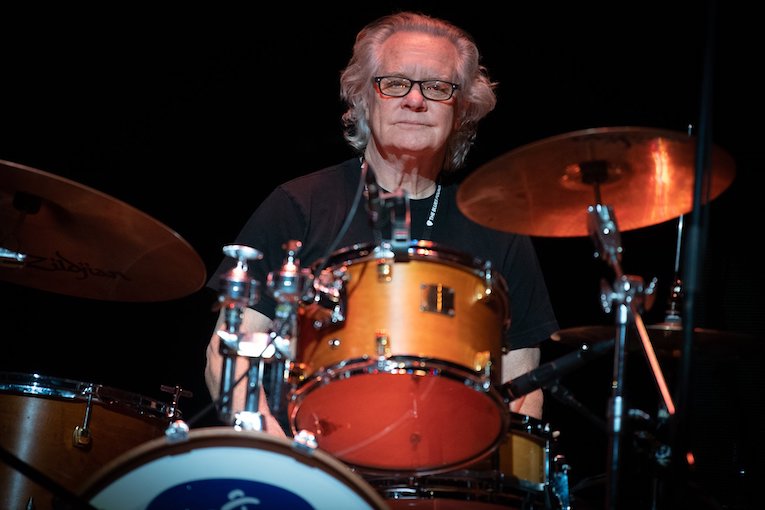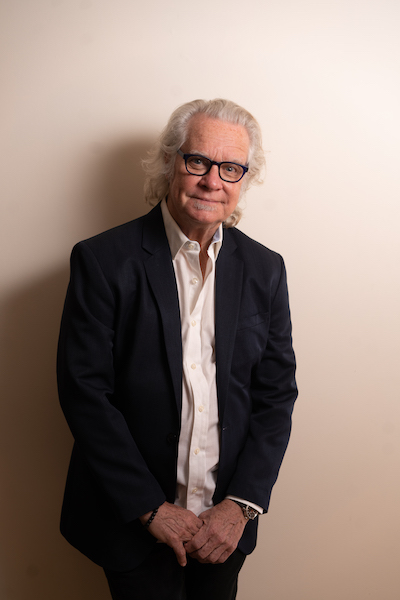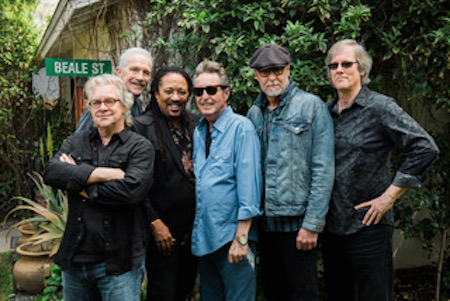
Photo: Tony Braunagel by Laura Carbone
By Martine Ehrenclou
Tony Braunagel is an American drummer, producer, composer and songwriter from Houston, Texas, now based in Los Angeles, CA. Braunagel has played on many film scores and television shows as well as numerous albums as a musician, composer and producer. As a session drummer and percussionist, he’s played on over 200 albums including those of Otis Rush, Eric Burdon, Johnny Nash, Coco Montoya, Lucky Peterson, John Mayall, and more, as well as Grammy winning albums of Bonnie Raitt, Taj Mahal, Buddy Guy. He’s performed live with too many music icons to count, including Bonnie Raitt, Rickie Lee Jones, B.B. King, Lightnin’ Hopkins, John Lee Hooker, Robert Cray, Bette Midler, Lyle Lovett, and Taj Mahal.
Several of the albums Braunagel played drums on won Grammy Awards, including Taj Mahal with The Phantom Blues Band, of which he has been a member since its start, Señor Blues, Shoutin’ in Key, Buddy Guy’s Feels Like Rain, Bonnie Raitt’s Nick of Time and Luck of the Draw, and more.
Braunagel is also a highly respected producer and has produced over 20 artists in connection with more than 40 albums, winning Grammy Awards and Blues Music Awards for Shoutin in Key by Taj Mahal, Trampled Under Foot’s Badlands plus producing and performing on Hard Truth and Coming in Hot by Coco Montoya, Cry No More by Danielle Nicole (Grammy nominee), Nick Schnebelen’s Crazy All by Myself, several of Curtis Salgado’s albums and performing on several of Eric Burdon’s albums,
Martine: You’re producing and playing music again after the pandemic. What are you working on?
Tony: We’re back at playing live music. We’ve had some healing in our country and in our world with the vaccinations. I’m looking forward to more of this. I got home from a week in Kansas City producing an artist by the name of Danielle Nicole.
Martine: Danielle Nicole, of course. She’s fantastic.
Tony: Is she a talent or what?
Martine: Oh yes. Didn’t you produce her last album, Cry No More?
Tony: I produced Cry No More. Got a Grammy nomination. Before I’d had Blues Music Awards with her and Trampled Underfoot. I did her second one and now I’m doing her third. We’re in process and it sounds fantastic. We’re doing it different this time, not using studio musicians, using her band that plays live with her. And man, we got a great feel and a great vibe in the studio.
Martine: What kind of music is the new album?
Tony: She’s a combination of modern R&B, blues and rock and it rocks pretty hard. It’s played with the influence of the blues. I wouldn’t call it hard rock. If you have to nail it down, you get closer to blues/rock. I think because of the way she writes and sings that she makes the songs sound like hits. She’s writing all of these herself. 12 songs, one’s a cover, 11 of these songs from her heart. She’s fabulous, she’s about the most favorite artist I’ve ever worked with, I got to tell you.
Martine: She has an incredible voice. I was so impressed by Cry No More. It gave me chills it was so good.
Tony: Thank you. We felt pretty special when we were making it. We could feel it every day and there’s nothing like that feeling. With Danielle, while it’s happening, it’s out of body. It happens as an inspiration almost all of the time. She’s full of magic. She has her heart on her sleeve and she expresses herself incredibly well with her voice.
Martine: Tell me about what you do as a producer.
Tony: Often, I’m the guy who starts the engine, and then pulls the car away from the curb and then somebody else drives, or we take turns driving. I’m the guy that walks in the room and turns on the light and at the end of the day, I turn out the light and we go home. (Laughter) That’s my job. You have to do a lot of advance work. Everybody comes in, we all get together. We all do it as a creative community project. With everybody’s ideas, I might ixnay or yay or try to inspire more. But at the end of the day, I’m there to enable everybody else make them be proactive in the creative effort.
Martine: What else do you do as a producer?
Tony: The ramp up is a phone call. “Do you have any songs? Will you send them to me? You have five songs. You want to make a whole album. We need seven more. Do you want me to help you write them, or do you want me to help you find songwriters? Because I can get you co-writers that are first-class songwriters that have lots of covers and some hits.” Or I can go into the song book, which means I just start looking. I find songs that have been recorded that would work for that artist, in that artist’s voice, who that person is when they open their mouth and start to sing. Not everybody can sing songs about everything.
Some people have trouble singing happy songs and some people can only sing happy songs. Others want to sing songs about love and it’s not always positive. Everybody’s different. Once I get working with them, I get them to go outside their comfort zone a little bit and see who they are as a singer, almost like an actor in a scene. (I ask) this female singer, “Who are you in this song? You got hurt. He did wrong and now you’re trying to look at it in an objective way or you’re mad and you got the blues and you’re going to scream at him. You need to come out the winner in this song at the end of it. You can’t just read the words. It’s got to come out of you as though you were acting.”
Martine: It sounds like it can be an intimate process with you and the artist.

Photo: Tony Braunagel
Tony: It’s often an intimate process. It’s not always. Not all artists allow it. I wouldn’t go up to a certain female artist that’s going to have a hand up the whole time you’re talking to her. I’m not going to get around that hand. I’m going to say something that resonates so she gets it. I see her eyebrows go up and she says, “Oh, that’s a good idea.” Then of course it’s her idea. With certain people there’s a knack to that.
Martine: You must be intuitive.
Tony: (Laughter) I really have to be. It’s part of how you figure out what should go down. I never do it to manipulate because that’s wrong. If I see somebody open enough that I’m able to lean on their feelings a little bit and be a little intimate to get them to go to a certain place and they allow me to, they don’t back off, get mad, get hurt or intimidated, then I’ll lean in a little bit. But I usually know when to back off and let it go. Often when you get that close into somebody, you back off and you look at them, you smile and they go, “Oh, I get it.” And they get it just by getting that close to their heart or their soul.
Martine: That’s a beautiful thing.
Tony: There’s nothing like the feeling, Martine, when it’s happening, there’s nothing like it. We were talking about Danielle–I say very little to Danielle, but when I need to say something, and she knows now with our dynamic, that if I’m saying something to her, that I mean what I’m saying, I’m not just bullshitting her.
In the beginning she and I wrote songs together. The first album I produced for her and her brothers, she and I wrote a ballad and it was about a breakup. We were both going through it and I was heavily going through it. I said, “Can I write the song with you?” And she goes, “Yeah.” And I said, “Because I’m going through exactly what you’re going through, almost.” We made each other cry while we were writing the song.
Martine: Talk about intimate.
Tony: She trusts me. I’m close enough that she could tell me just about anything. It’s a very funny thing producing and handling people. Then there are cases where I don’t have to do a lot. I get an artist in the studio and I might have discussions with the executive producers or the label, whomever handles the business side of it, and they often have ideas about how they want to approach the production.
Martine: What do you look for in an artist that you are considering producing?
Tony: It’s going to be a matter of, is it special? Does the voice sound great? Is he/she trying to say something? Is he/she emoting? Is it marketable? My favorite thing to ask is “what is your destination?” If I have a blues/rock guitarist come in and he wants to do an album, then I want to make the record slightly different than what he’s done so he stands out from the three blues/rock records he’s made.
Martine: Do you use the same musicians every time when you produce?
Tony: I have a huge circle, but I use a lot of the same guys. If it’s around the blues and R&B genre, I have several bass players that I use. I have seven guitar players, usually squirrel it down to two or three of them. Same with keyboard players. For years I’ve been using Mike Finnigan quite a bit and I like Jim Pugh. If I go a little jazzier, I bring some jazzier guys in. Over the years I’ve used a different bevy of musicians. But I do stick with people that I know that will be part of that community of creativity.
I love it when you bring in a demo or a song, and you might have a chord chart without a strict arrangement, and the singer stands there next to the piano and sings while the piano player’s playing it, or the guitar player’s running through it, or if the artist plays a guitar or keyboard, then you let them play it and they get the song across. Then we talk about how we’re going to do it. Then one guy in the band will go, “What if we did this here?” And you say, “Yeah, I’m listening.” And we get this great idea together and it becomes a brilliant part.
Martine: Sounds like a wonderfully creative process.
Tony: It really is. I hire those guys that I’m pretty sure are going to do that. I’ve produced before where I’ve gotten a room full of people that didn’t have that magic and quality. I’ve got to find a way to get inside their heads as players and show them what I’m trying to get out of this record without manipulating too hard, or being the butthead.
Martine: You probably use some of the same skills with the musicians that you do when you’re producing an artist.
Tony: Exactly. It falls in line with that. When I’m playing drums behind most of the tracks, I can direct from behind the drum kit. I usually direct the band when I’m playing with them. If we’re playing live or even as a studio musician, unless I’m reading off of the paper, I’m doing a certain amount of direction just by the drum fills that I play and the dynamics that I set up. I work the same way when I’m playing and producing because I hear the music coming.
I’ve only had a few situations where I produced a band where the guy didn’t want to do what I wanted to do. “I got to be honest with you,” I told him (laughter.) Young, nice guy, but he had attitude from the beginning. I brought certain symbols and snare drums into the studio. I said, “Well, some of your stuff is going to work, but I want you to try these.” And he tried them, then he goes, “That’s okay. I rather use mine.” I go, “It’s not a matter of whether you’d rather use yours, it’s a matter of what this record is supposed to sound like.” And he said, “No, I don’t want to do that. I want to do this.” I said, “Okay, well, here’s the deal. I have control over the mix. And you may not be able to hear your drums quite as much if I don’t like the way they sound.”
Martine: (Laughter) How did he respond to that?
Tony: (Laughter) The guys in the band were smiling and laughing because he’s a little smart ass. It was okay. He might’ve been intimidated. We didn’t talk about it anymore. I carried forth and still went in and said no changes to the snare drum. “Put these symbols up, try that.” To the point where he’d go, “Hey can I try that other snare drum?” I said, “Yeah, but take the pitch down a little bit. Let’s try it first.” Just a couple of times just to make him feel like he was along for the ride.
The second day of tracking, nobody was in the control room but me. He walks in and says, “Hey, man, I just want to say, the drums are sounding pretty damn good.” I said, “Oh, I’m so glad you liked them. Does that mean I can turn them up now?” (laughter)
Martine: (Laughter) Do you think you have a certain sound when you produce? Let’s say when you use the Phantom Blues Band musicians to come in, do you think you have a certain sound,? I’m thinking of The Swampers of Muscle Shoals who have their sound.

Photo: Tony Braunagel, The Phantom Blues Band
Tony: You’re right on it. Yeah, just like Motown or Stax, or as you put it, Muscle Shoals. People have come from other places in the country and made albums here with us, with the Phantom Blues Band at Ultratone, the studio we use that Johnny Lee Schell runs. They’ve said, “You guys are like the Stax or Muscle Shoals of the West Coast.” I probably produced about almost 30 records out of there.
Kid Andersen’s operation up in San Jose, between the two of us, we’ve nailed a thing here. Kid and I are very good friends. I played on a record up there that he produced. We talk all the time about this. We have great inside producers conversations. “So what about that one? What’d you do there?” Oh God, we talk about our nightmares (with producing.)
Martine: I’d love to be a fly on the wall for those conversations. Tell me about the new Taj Mahal album.
Tony: We called all the other members of The Phantom Blues Band. At the time, Mike Finnigan was on the road with Bonnie Raitt full time, so we used Jon Cleary from New Orleans and Mick Weaver. Both of those keyboard players had been in Phantom Blues Band incarnations earlier. We started with the band that way with Johnny Lee Schell, Larry Fulcher, myself, Les Lovitt and Joe Sublett. And we have Taj Mahal.
Martine: Is the album coming out soon?
Tony: We’re in negotiations right now and we’ve got some really good strong negotiations going on here with three separate entities. I’m especially excited about one of them, because I think we can blow it up and I think they get it. We hope to have a release sometime early, maybe first quarter 2022.
Martine: That’s coming up quick.
Tony: I always say when you see a herd of cattle out in a field and they’re all trying to run to the barn to eat, they all have to get through the gate. When you’re finishing a record and you’ve had all this wide open creativity and you’ve got tracks all over the place, contracts that this lawyer sent you. I’ve got piles of stuff. We got to shove all of this through that little bitty opening so you can close the gate.
Martine: That’s a great analogy
Tony: You could say, “All right, all the cows are in the barn now, release the record.”
Martine: (Laughter) Are you producing the album too?
Tony: Co-producing, yes, with my bass player and buddy, Larry Fulcher. We believe that something really special needs to happen with Taj Mahal. We love what we do and we have a lot of faith that we can make something really special with Taj Mahal. Looking back on what Phantom Blues Band has done with him, we did a live record with Taj at The Mint that I produced and it won a Grammy. The first three records, produced by John Porter, all got Grammy nominations and we won a Grammy for the third one, Señor Blues. The bottom line is we’ve been working six years and we’re about to wrap up a fantastic release for Taj Mahal and the Phantom Blues Band.
For more information on Tony Braunagel see his website here

Leave A Comment